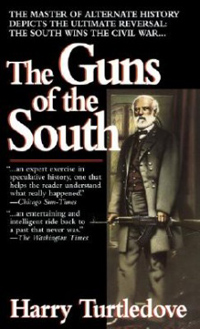The Guns of the South (1992) was the first, or anyway the first I encountered, of the new kind of time-travel alternate histories, the kind where a group of people from the future, with their technology, turn up in a particular point in the past and change it. There were plenty of stories about organized groups of time travellers trying not to disturb the past, and also plenty about one person, without more than he could carry, changing things, starting from De Camp’s Lest Darkness Fall (1939) but what made The Guns of the South innovative was doing it with a whole group of people and their stuff. It was followed with Stirling’s Island in the Sea of Time (the island of Nantucket in the bronze age) and Flint’s 1632 (a US steel town transported to Europe of 1632) and at this point it’s pretty much a whole subgenre.
What makes the book so great is that it’s told entirely from the points of view of the Confederate general Robert E. Lee and Nate Caudwell, a sergeant in the Confederate army. The reader immediately recognises what an AK47 is, and knows where the white supremacists have come from to help the South, but the way Lee and Caudwell learn about them and their intentions, and the way the tide of history is turned, makes for a compelling story. Only about a third of the book is about the way the AK47s help the South win the Civil War; the rest is about what happens afterward, and the uneasy relationship with the men from the future.
Spoilers!
I have always been a pushover for stories of history of technology, but I’ve never been very much interested in the US Civil War. It wasn’t covered in the history I studied in school. Indeed, after reading about it in Fire On the Mountain (John Brown wins, Mars landing in 1950) and Bring the Jubilee (South wins at Gettysburg, only it’s cleverer than that) and then The Guns of the South, I decided I’d better read a book about the real history because I was getting confused. Indeed, after reading about it I’m still not all that much interested in it. Fortunately I read The Guns of the South before I got online, or seeing flame wars about States Rights might have put me off picking it up. Knowing what a thorny subject it can be, and how alive the issues are in the minds of many Americans even now, I admire how well Turtledove steered his way through so many potential shoals with this novel.
Turtledove clearly did his homework—the details of the past, and the way the soldiers react to the new rifles and to the dehydrated meals feel exactly right. The chant they set up once they have the AK47 “Enfield, Springfield, throw them in the cornfield!” has exactly the authentic ring of those marching chants. The details of how a woman gets away with being in the ranks are excellent, and the character of Lee comes over very clearly. The events of the changed history, the way Britain is forced to recognize the Confederacy, the settlement, the elections, and the war between the USA and Canada all flow from the Southern victory and its consequences in the kind of way things happen.
If the book has a flaw it’s that things are too easy. The Rivington men are Afrikaaners, fanatical white supremacist separatists from 2014, and they’re horrible. That they’re horrible makes it a much better book, because they do have their own agenda and it’s different from what Lee wants, and what the South would have wanted. Where it’s too easy is the way they try to assassinate Lee at his inauguration and make themselves his open enemies and allow him to declare martial law and assault them. They’re never shown as being idiots before. They could have stuck it out, or killed him quietly by a sniper Kennedy-style. Their attempt allows the last part of the book to be a war against superior technology, as the first part has been a war against inferior technology, but it’s a cheat. It’s the only thing that does feel like a cheat, and so it stands out more. I’m not entirely convinced that Lee and the South would have gone for abolishing slavery slowly—my goodness, I’ve met people online more in favour of slavery in the Confederacy than most of the Confederates in this book. But I’d rather spend time with nice people than evil ones, most of the time, so I’ll give it a pass on that.
This is a hugely enjoyable read, and I think probably still Turtledove’s best novel.
Jo Walton is a science fiction and fantasy writer. She’s published eight novels, most recently Half a Crown and Lifelode, and two poetry collections. She reads a lot, and blogs about it here regularly. She comes from Wales but lives in Montreal where the food and books are more varied.










